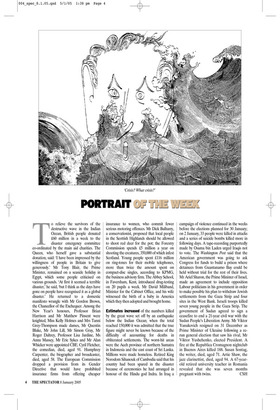PORTRAIT OW THE WEEK T o relieve the survivors of the
destructive wave in the Indian Ocean, British people donated £60 million in a week to the disaster emergency committee co-ordinated by the main aid charities. The Queen, who herself gave a substantial donation, said: ‘I have been impressed by the willingness of people in Britain to give generously.’ Mr Tony Blair, the Prime Minister, remained on a seaside holiday in Egypt, which some people criticised on various grounds. ‘At first it seemed a terrible disaster,’ he said, ‘but I think as the days have gone on people have recognised it as a global disaster.’ He returned to a domestic manifesto wrangle with Mr Gordon Brown, the Chancellor of the Exchequer. Among the New Year’s honours, Professor Brian Harrison and Mr Matthew Pinsent were knighted, Miss Kelly Holmes and Mrs Tanni Grey-Thompson made dames, Mr Quentin Blake, Mr John Lill, Mr Simon Gray, Mr Roger Daltrey, Professor Lisa Jardine, Ms Anna Massey, Mr Eric Sykes and Mr Alan Whicker were appointed CBE. Cyril Fletcher, the comedian, died, aged 91. Humphrey Carpenter, the biographer and broadcaster, died, aged 58. The European Commission insurance to women, who commit fewer serious motoring offences. Mr Dick Balharry, a conservationist, proposed that local people in the Scottish Highlands should be allowed to shoot red deer for the pot; the Forestry Commission spends £5 million a year on shooting the creatures, 350,000 of which infest Scotland. Young people spent £116 million on ring-tones for their mobile telephones, more than twice the amount spent on compact-disc singles, according to KPMG, the business advisory firm. The Abbey School, in Faversham, Kent, introduced drug-testing on 20 pupils a week. Mr David Miliband, Minister for the Cabinet Office, and his wife witnessed the birth of a baby in America which they then adopted and brought home.
Estimates increased of the numbers killed by the great wave set off by an earthquake below the Indian Ocean; when the total reached 150,000 it was admitted that the true figure might never be known because of the difficulty of accounting for deaths in obliterated settlements. The worst-hit areas were the Aceh province of northern Sumatra in Indonesia and the east coast of Sri Lanka. Millions were made homeless. Retired King Norodom Sihanouk of Cambodia said that his country had been spared in the disaster because of ceremonies he had arranged in honour of the Hindu god Indra. In Iraq a campaign of violence continued in the weeks before the elections planned for 30 January; on 2 January, 33 people were killed in attacks and a series of suicide bombs killed more in following days. A tape-recording purportedly made by Osama bin Laden urged Iraqis not to vote. The Washington Post said that the American government was going to ask Congress for funds to build a prison where detainees from Guantanamo Bay could be held without trial for the rest of their lives. Mr Ariel Sharon, the Prime Minister of Israel, made an agreement to include opposition Labour politicians in his government in order to make possible his plan to withdraw Jewish settlements from the Gaza Strip and four sites in the West Bank. Israeli troops killed seven young people in the Gaza Strip. The government of Sudan agreed to sign a ceasefire to end a 21-year civil war with the Sudan People’s Liberation Army. Mr Viktor Yanukovich resigned on 31 December as Prime Minister of Ukraine following a rerun general election that saw his rival, Mr Viktor Yushchenko, elected President. A fire at the Republica Cromagnon nightclub in Buenos Aires killed 188. Susan Sontag, the writer, died, aged 71. Artie Shaw, the jazz clarinettist, died, aged 94. A 67-yearold retired university teacher in Romania revealed that she was seven months pregnant with twins. CSH










































 Previous page
Previous page